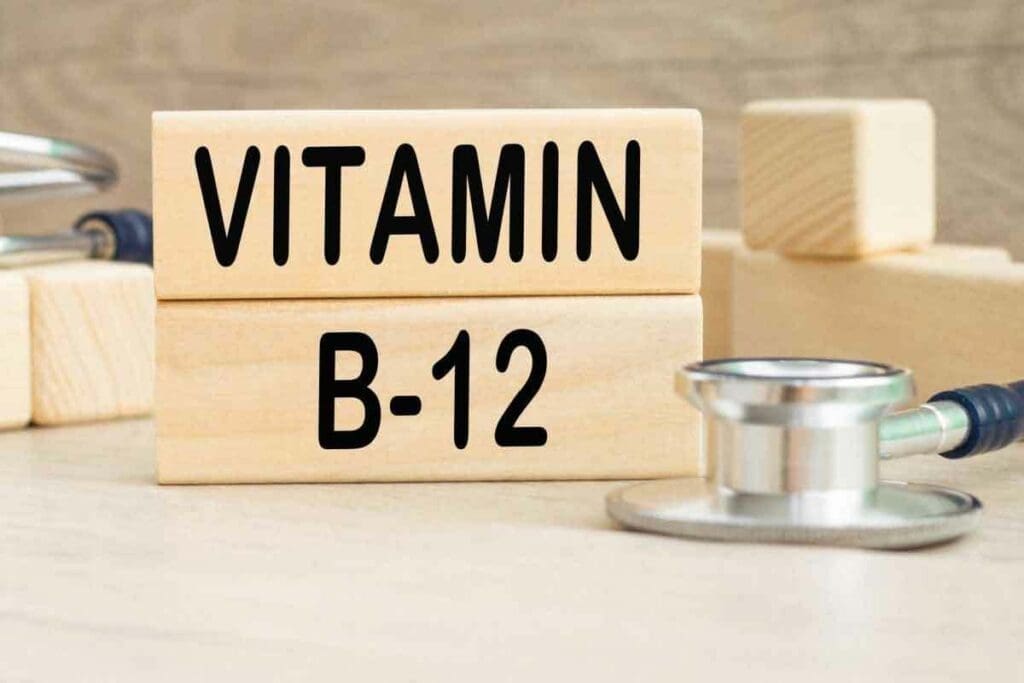Last Updated on November 17, 2025 by Ugurkan Demir

At Liv Hospital, we know how vital folate and vitamin B12 are for our health. Folate, or vitamin B9, helps make red blood cells and prevents brain and spine birth defects.
Low folic acid can occur if we don’t get enough, can’t absorb it properly, or have increased requirements. It’s important to understand the reasons and signs of folate deficiency. We’ll also explore how B12 and folate deficiency are connected and how we treat them at Liv Hospital.

Vitamin B12 and folate are key for many body functions. They help make red blood cells and DNA. Without them, health problems can arise.
Vitamin B12 and folate are vital for making red blood cells. Folate is key for DNA synthesis, which is needed for cell division. Vitamin B12 helps in the metabolism of fatty acids and amino acids. A lack of either can cause anemia, leading to fatigue and weakness.
The process of DNA synthesis is complex. It needs folate and vitamin B12. Folate turns into tetrahydrofolate, used in DNA building blocks. Vitamin B12 regenerates tetrahydrofolate, keeping DNA synthesis going.
| Nutrient | Role in Red Blood Cell Production | Role in DNA Synthesis |
| Folate | Essential for DNA synthesis, necessary for cell division | Converted into tetrahydrofolate for purine and pyrimidine synthesis |
| Vitamin B12 | Involved in fatty acid and amino acid metabolism | Necessary for tetrahydrofolate regeneration |
Vitamin B12 is vital for the nervous system. It helps in myelin synthesis, protecting nerve fibers. Without enough, you might feel numbness, have trouble walking, or notice cognitive changes.
Folate also supports the nervous system, though its deficiency is less common. It’s important for homocysteine metabolism. High homocysteine levels can harm the brain and increase dementia risk.
Knowing how vitamin B12 and folate work in our bodies is key. Not having enough can cause serious health issues. It’s important to catch and treat deficiencies early.

It’s important to know the difference between folate and vitamin B12. They are both vital for our health but are not the same. They have different structures, sources, and roles in our bodies.
Folate, or vitamin B9, is found in foods like dark green leafy veggies, beans, peas, and nuts. It has a special structure with a pteridine ring and p-aminobenzoic acid and glutamic acid. Vitamin B12, or cobalamin, is in animal products like fish, meat, eggs, and dairy. It has a cobalt ion at its center.
Folate and vitamin B12 come from different foods. Folate is lost in heat and water, so cooking can reduce its amount. Vitamin B12 stays stable in cooking but can be lost in water if not eaten.
Folate and vitamin B12 have different jobs in our bodies. Folate helps with DNA and cell growth. Vitamin B12 is key for making red blood cells and keeping nerves healthy.
Both deficiencies can cause anemia, but B12 issues can also harm nerves. Knowing their roles helps doctors find the right treatment.
Low folic acid levels can lead to serious health issues. It’s important to know the risks of folate deficiency. Folic acid helps make red blood cells and keeps the nervous system working right.
Folate deficiency can cause megaloblastic anemia. This is when red blood cells are too big and can’t work well. Symptoms include:
These symptoms happen because the body doesn’t get enough oxygen. Oxygen is key for the body to work right.
Folate deficiency affects more than just red blood cells. It can harm pregnancy outcomes, raising the risk of birth defects. It can also lead to other health problems, like:
A study found, “Folate deficiency is linked to many health issues, from anemia to neurological disorders” (
This shows why keeping folate levels up is key for health and well-being.
Knowing the dangers of low folic acid is the first step to managing health risks. By spotting folate deficiency signs and acting fast, people can avoid serious health problems.
It’s important to know why people might not get enough vitamin B12 and folate. These issues can come from not eating enough of these nutrients, not being able to absorb them, or having a long-term illness.
Not getting enough folate and vitamin B12 from food is a big problem. Folate is in leafy greens, legumes, and citrus fruits. Vitamin B12 is mainly in animal products. Vegans are at a higher risk of not getting enough vitamin B12 because they don’t eat animal products.
| Nutrient | Dietary Sources | At-Risk Populations |
| Folate | Leafy greens, legumes, citrus fruits | Individuals with poor diet, pregnant women |
| Vitamin B12 | Animal products (meat, fish, dairy) | Vegans, elderly individuals |
Some health issues make it hard for the body to absorb these vitamins. For vitamin B12, the body needs intrinsic factor to absorb it in the ileum. Conditions like Crohn’s disease or celiac disease can cause malabsorption.
“Malabsorption of vitamin B12 is a significant concern in patients with gastrointestinal disorders.”
— Source: Journal of Clinical Gastroenterology
Long-term illnesses and some medicines can also lead to deficiencies. For example, long-term use of proton pump inhibitors can affect vitamin B12 absorption.
Knowing these causes helps doctors find better ways to prevent and treat these issues.
It’s key to know the levels of vitamin B12 and folate in our bodies. This helps doctors find and treat health problems early. They can spot anaemia and other issues by checking these levels.
Lab tests are vital for checking vitamin B12 and folate levels. Serum or plasma vitamin B12 levels show how much vitamin B12 we have. These tests tell doctors if we might be low.
Folate levels are tested too. Doctors look at the blood or red blood cells for folate. This helps spot folate deficiency, which can cause similar symptoms to vitamin B12 deficiency.
Numbers below 200 or 250 pg/mL are often seen as low for vitamin B12. But, what’s considered low can change based on the lab and test method. It’s important to look at these numbers with the person’s health in mind.
For folate, it’s about understanding the numbers and what the lab says is normal. A level below a certain point (usually around 4-6 ng/mL) might mean we’re low. Doctors use these numbers, along with what symptoms we have, to make a diagnosis.
By correctly diagnosing and understanding vitamin B12 and folate levels, doctors can create better treatment plans. This helps improve how we feel and live healthier lives.
It’s important to know the difference between vitamin B12 and folate deficiency. Both can cause similar symptoms, but they have different signs. This makes it key to diagnose and treat them correctly.
Both deficiencies can lead to megaloblastic anemia. This means red blood cells are too big and don’t work right. Symptoms include fatigue, weakness, and shortness of breath.
These symptoms are the same for both deficiencies. This makes it hard to tell which one is causing the problem just by looking at blood cells.
Vitamin B12 deficiency has a unique symptom: neurological problems. Vitamin B12 helps make myelin, which protects nerves. Without enough B12, nerves can get damaged.
This damage can cause demyelination. Symptoms include numbness, tingling, and problems with walking and thinking.
Folate deficiency doesn’t usually cause nerve problems. Folate is important for making DNA and fixing DNA damage. But it doesn’t play a big role in keeping nerves healthy.
This is why folate deficiency mainly affects blood cells, not nerves. Knowing these differences helps doctors give the right treatment. It helps prevent serious problems later on.
Using folate to treat B12 deficiency can hide serious health issues. Folate can fix anemia but won’t fix the brain problems caused by B12 lack. This is because folate and B12 work together in the body.
Vitamin B12 and folate are key for making DNA and red blood cells. Folate helps turn homocysteine into methionine, and B12 is needed for this. Without B12, folate can’t do its job right.
This connection is important. Folate can fix some problems caused by B12 lack, like anemia. But it can’t fix the brain damage from B12 deficiency. So, if B12 deficiency is not treated, brain problems can get worse.
It’s important to test for B12 and folate levels correctly. We need to check both vitamins in the blood. We also look at how the patient feels, like if they’re tired or weak.
Testing for B12 is key because brain problems from it can’t be fixed if not caught early. Folate can hide the signs of B12 deficiency, making it seem like the patient is getting better when they’re not.
We should test for both B12 and folate levels. This way, we can find and treat any deficiency right. It helps avoid treating one problem while missing another.
In short, knowing how B12 and folate work together and testing them correctly is vital. This way, we can make sure patients get the right treatment for their needs. It helps avoid hiding B12 deficiency with folate treatment.
Managing vitamin B12 deficiency requires several key strategies. It’s important to treat it to avoid serious health issues like neurological damage and anemia. We’ll look at the main treatments, including oral supplements and injectable therapy.
Oral vitamin B12 supplements are a good option for mild cases or those who don’t like injections. Even without intrinsic factor, a small amount of vitamin B12 is absorbed through passive diffusion.
A study on the National Center for Biotechnology Information website shows oral supplements work well in some cases.
Injectable vitamin B12 is best for severe cases, malabsorption, or neurological symptoms. It delivers vitamin B12 directly into the bloodstream, avoiding absorption issues.
Injectable B12 is given intramuscularly. The frequency of injections depends on the severity of the deficiency and how well the body responds.
Regular checks are key after starting treatment to see if it’s working. Blood tests are used to monitor vitamin B12 levels and check for improvements in blood and nerve health.
Long-term treatment is often needed, mainly for those with underlying conditions causing the deficiency.
Here’s a comparison of oral supplementation and injectable therapy for vitamin B12 deficiency:
| Treatment Aspect | Oral Supplementation | Injectable Therapy |
| Absorption Method | Passive diffusion | Direct into bloodstream |
| Preferred For | Mild deficiency, patient preference | Severe deficiency, malabsorption |
| Administration Frequency | Daily | Weekly/Monthly |
Illustration of vitamin B12 injection:
To fix low folic acid, knowing about supplements and diet changes is key. It’s important for health. You can use supplements and change your diet to fix it.
Supplements are a direct way to fix low folic acid. The amount needed changes with age, pregnancy, and health issues. Adults need 400 mcg daily, but pregnant women or those with certain conditions might need more.
Choosing a good supplement is important. Look for one from a trusted maker. Also, talk to your doctor about the right dose and any possible side effects.
Eating foods high in folate is also key. These include spinach, kale, lentils, chickpeas, and oranges. They help prevent folate anaemia.
It’s also important to think about how well your body absorbs folate from food. Natural folate is not as easily absorbed as the folic acid in supplements. So, eating a variety of whole foods helps get more folate.
In the UK, there are efforts to get more folate in people’s diets. This includes food fortification and dietary advice. These steps aim to lower folate deficiency and related health problems.
Treating both vitamin B12 and folate deficiencies requires a detailed plan. We must consider how these nutrients work together. This approach helps manage both the blood and nerve problems caused by these deficiencies.
When treating both B12 and folate deficiencies, starting with B12 is key. This prevents hiding of nerve symptoms if folate is given first. We use injections or high-dose pills to boost B12 levels, based on the patient’s needs.
After B12 levels are good, we focus on folate. This might mean taking folic acid pills, eating more folate-rich foods, or both. It’s important to watch how the patient responds and adjust the treatment as needed.
Managing these deficiencies long-term means regular checks and possibly lifelong supplements. We must keep an eye on b12 and folate levels to make sure they’re okay. We also need to find and fix any reasons for these deficiencies, like not getting enough nutrients or problems with absorbing them.
Some patients might need to keep getting b12 injections or taking pills. For folate, teaching patients about folate-rich foods is very helpful. We also have to watch for any bad reactions with other medicines, like iron supplements.
With a thorough and step-by-step treatment plan, we can help patients with both B12 and folate deficiencies. Regular check-ups and adjusting the treatment as needed are key for long-term success.
Some groups face a higher risk of vitamin B12 or folate deficiency. Older adults, pregnant women, and those with certain gut issues are more at risk. These groups need extra care to avoid these deficiencies.
Older adults often struggle with getting enough vitamin B12 and folate. This is due to eating less, not absorbing nutrients well, and taking some medicines. Up to 40% of seniors might not get enough vitamin B12.
Pregnant women need more folate for their baby’s growth. Not getting enough folate can cause serious problems, like neural tube defects. So, taking folate supplements is often advised.
People with gut problems, like celiac disease or Crohn’s disease, can’t absorb vitamin B12 and folate well. This can lead to deficiencies if not managed right with diet and supplements.
The table below shows the main risks and effects of vitamin B12 and folate deficiencies in these groups:
| Population | Risk Factors | Consequences of Deficiency |
| Elderly Individuals | Decreased dietary intake, malabsorption, certain medications | Anemia, neurological issues, cognitive decline |
| Pregnant Women | Increased demand for folate | Neural tube defects, anemia |
| Individuals with Gastrointestinal Disorders | Malabsorption due to conditions like celiac disease or Crohn’s disease | Anemia, fatigue, neurological problems |
Knowing these risks helps doctors give better care. They can offer diet advice and supplements to help these groups avoid vitamin B12 and folate deficiencies.
Keeping enough vitamin B12 and folate is key to staying healthy. The right amount of folate varies from 65 mcg for infants to 400 mcg for adults. Pregnant and lactating women need even more. Low folate levels can cause folate anaemia and other health issues.
Recent studies show 22.8% of nonpregnant women aged 12 to 49 in the U.S. have low folate levels. This shows we need to focus on diagnosis and treatment. Thanks to folic acid fortification, deficiency rates have dropped worldwide. For more info, check out the National Center for Biotechnology Information.
Knowing how vital vitamin B12 and folate are helps us stay healthy. We can prevent deficiencies by keeping levels in check. There are treatments like supplements and diet changes to help.
Folate and vitamin B12 are both important for making red blood cells and brain function. But they are different in how they work and where we find them. Folate is in leafy greens, while vitamin B12 is in animal products.
A low B12 number is below 200 pg/mL. But this can change based on the lab and the person. Levels from 200-300 pg/mL might be borderline.
Folate deficiency rarely causes brain problems. But vitamin B12 deficiency can lead to serious brain issues like numbness, tingling, and memory problems.
Doctors use blood tests to check vitamin B12 and folate levels. They look at the results in the context of the person’s health.
Treating folate deficiency without fixing vitamin B12 can hide symptoms. This can cause brain damage. It’s important to diagnose both correctly.
Treatment includes taking B12 orally or through injections. It’s also important to keep an eye on B12 levels to make sure they’re right.
Low folic acid can be fixed with supplements and eating foods rich in folate. Foods like leafy greens are good sources.
First, treat the more serious deficiency. Then, manage both nutrients long-term to keep levels right.
Elderly people, pregnant women, and those with gut problems are at risk. They need extra attention to their B12 and folate needs.
Keeping levels right is key to avoiding deficiencies. It helps make red blood cells and supports the brain. This is important for overall health.
No, folate and vitamin B12 are different. They have different structures and roles, even though they’re both important for similar body functions.
Yes, not eating enough animal products or leafy greens can lead to deficiencies. This is because vitamin B12 is in animal products and folate is in leafy greens.
https://www.nhs.uk/conditions/vitamin-b12-or-folate-deficiency-anaemia/treatment
Subscribe to our e-newsletter to stay informed about the latest innovations in the world of health and exclusive offers!